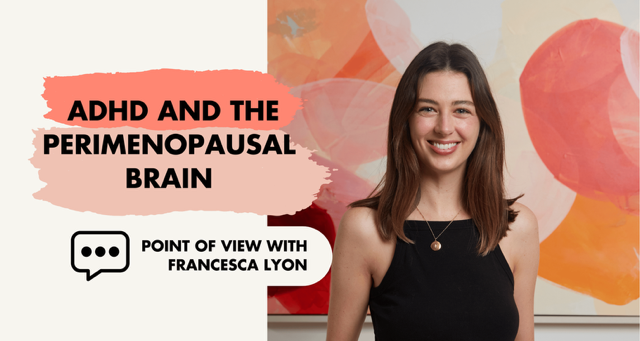Director of Nutrition, Francesca Lyon explores the complex connection between ADHD and the perimenopausal brain. As shifting hormones collide, many women find their symptoms intensifying. Francesca unpacks why this happens—and how targeted nutrition and nervous system support can make a real difference.
For many women, the transition into and through perimenopause arrives unexpectedly, often feeling like a gradual loss of connection with who they once were. With symptoms such as brain fog, increased irritability, poor sleep and new anxiety, they suddenly or not so suddenly, no longer feel like themselves. For others, it’s the moment when long-standing difficulties with focus, organisation, and impulse regulation become impossible to ignore as they get worse and worse. Increasingly, research, practitioners and women themselves are beginning to connect the dots between these experiences during perimenopause and attention-deficit/hyperactivity disorder (ADHD).
What is interesting is that ADD/ ADHD is a condition that is often overlooked in women and frequently under-diagnosed until midlife. But the question is why? Why are symptoms increasing during perimenopause and what is the link?
What happens in perimenopause?
In perimenopause the first thing to decline is your progesterone. Progesterone is a vital hormone for our fertility and vitality, but also for focus, memory, mood, sleep and it also functions as an anti-anxiety hormone too (although this is not always the case for those who are neurodivergent or have ADHD as we will explore). During later stages of perimenopause estrogen joins in the dance and begins to fluctuate wildly (often reaching levels higher than any other hormonal stage of your life), before it eventually decreases too.
Read more about progesterone here.
Read more about perimenopause here.
So what is the link between perimenopause and ADHD?
Well at the same time that estrogen and progesterone levels begin their erratic dance (remember this can be over the 2-15 years before menopause) and eventual decline during perimenopause, many women report a dramatic increase of ADHD symptoms. What was once somewhat manageable—juggling deadlines, remembering appointments, keeping up with family and work demands—can suddenly feel overwhelming and unmanageable. This isn’t just a coincidence. Hormonal changes during perimenopause can profoundly change brain chemistry, particularly the dopamine and norepinephrine pathways that are already dysregulated in ADHD.

The link between perimenopause, changing estrogen and dopamine:
One of the biggest contributing factors to the worsening of ADHD symptoms in perimenopause is the link between estrogen and dopamine. Let me explain…
Estrogen is more than just a reproductive hormone (as all of our reproductive hormones are) — it plays a crucial role in brain function, particularly in areas related to attention, memory, mood, and motivation. One of its key effects is on the brain’s dopamine system, which also plays a main role in ADHD.
Dopamine is a neurotransmitter essential for executive functioning — things like planning, focus, impulse control, and the ability to regulate emotions. In people with ADHD, dopamine signaling is often impaired.
Estrogen helps enhance dopamine transmission as it increases dopamine synthesis and release and also improves the sensitivity of the dopamine receptors too.
This means that when estrogen levels are higher many women with ADHD may experience better focus, mood regulation, and cognitive clarity. Conversely, when estrogen levels drop, such as in the days before menstruation, after ovulation or during perimenopause to menopause this can lead to a noticeable worsening of ADHD symptoms: poor concentration, low motivation, irritability, and mental fatigue.
The real issues here is that estrogen doesn’t just decrease in perimenopause it fluctuates and drops in an unpredictable manner, which therefore results in major exacerbations and shifts in ADHD symptoms which is why it can serve as an almost ‘tipping’ point for many women and why they eventually seek support, answers and help during this time.

There is also a link between GABA and progesterone:
While estrogen tends to get most of the attention in discussions about hormone-brain interactions, progesterone plays a powerful and often forgotten role in mood regulation and emotional stability. One of its key actions in the brain involves its interaction with the GABA system.
What is GABA?
GABA (gamma-aminobutyric acid) is the brain’s main calming neurotransmitter. It reduces excitability, eases anxiety, promotes sleep, and stabilises mood. When you have a well-functioning GABA system you feel calm, grounded, and emotionally resilient.
So how does progesterone link to GABA? Progesterone itself doesn’t bind directly to GABA receptors, but its metabolite, allopregnanolone, is a modulator of GABA receptors. In simple terms:
- The progesterone metabolite allopregnanolone enhances GABA’s calming effects – this calms the brain.
- This is why high levels of progesterone, such as during the luteal phase of the menstrual cycle (after ovulation), often promote a sense of relaxation or sleepiness in many women (but not all).
But as we know, in perimenopause, progesterone levels begin to decline leading to lower levels of allopregnanolone and resulting in less GABA support. Therefore there is more anxiety, worse sleep (cue insomnia), and poor emotional regulation. The drop in progesterone can also worsen ADHD symptoms, as lower GABA levels make it harder to calm the brain’s internal noise and leads to increased issues with impulse control, anxiety, and increased emotional reactivity too.
There is also some research that suggests that those with ADHD and/ or neurodivergence have an issue with progesterone receptor sensitivity, suggesting their brain may not respond ‘normally’ to the calming effects of progesterone and its metabolites. It is important to understand this as it highlights the importance of individualised healthcare and understanding how we can help the individual in terms of prescribing both natural treatments and b-HRT too.
Perimenopause is a ‘stress test’
It is vital for women in perimenopause to know what is going on with their hormones, as not only is knowledge power but as perimenopause is a stress test on the body, it will reveal any and all weaknesses in the body and it is a time when extra support is not a luxury but a necessity.
It is also vital that women and healthcare practitioners understand what is going on to prevent misdiagnosis, such as being diagnosed with anxiety, depression or even early onset dementia, when in fact they are in perimenopause and may also have ADHD.
What can you do?
One of the key aspects that can be addressed in and before perimenopause, whether you also have ADHD or not, is supporting the nervous system. Due to the destabilisation of the HPA axis in perimenopause, one of the best things you can do to support yourself, your hormonal fluctuations, your progesterone receptors, your sleep and mental health is to support the nervous system. Some of the ways to support this include daily yoga nidra practice, sleep hygiene support, daily sunlight exposure, supplements like magnesium glycinate, vagal toning exercises, meditation, focusing on maintaining blood sugar balance through diet and protein and more. Alongside nervous system support, one of the key aspects to supporting you during this time is personalisation and individualised healthcare. Testing YOUR hormones and HPA axis (including stress hormones like cortisol) in the Advanced Hormone Test and receiving a personalised health plan and targeted supplementation, can help buffer these effects of increased ADHD symptoms in perimenopause and promote greater resilience and emotional stability throughout the transition.







